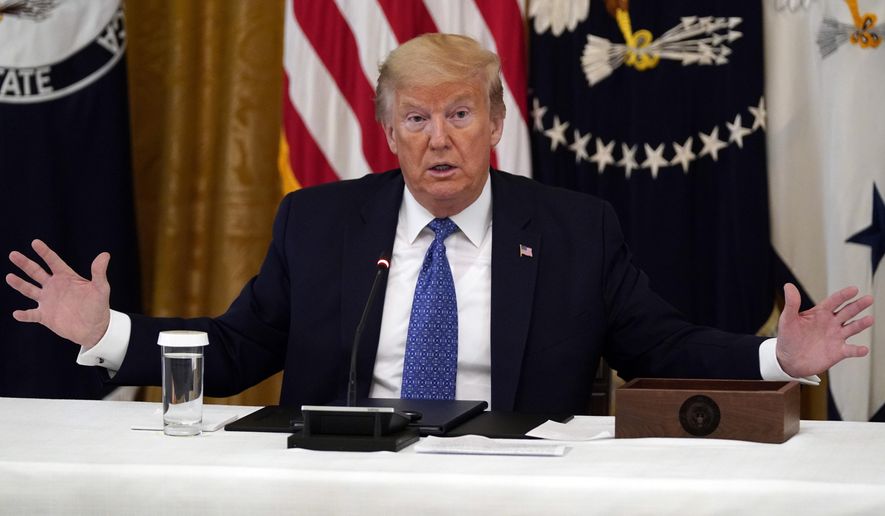ANALYSIS:
When the Justice Department released heavily redacted FBI wiretap applications to spy on Trump campaign volunteer Carter Page in July 2018, the media generally panned President Trump’s response.
It turns out that, based on the subsequent release of government documents, Mr. Trump was right on a number of his assertions, according to an analysis by The Washington Times.
That point has relevance today. Senate Judiciary Chairman Lindsey Graham, South Carolina Republican, has announced plans to hold a broad set of hearings in June into the FBI’s Russia probe. One main topic will be the bureau’s now-discredited Foreign Intelligence Surveillance Act (FISA) warrants.
In a nutshell, the released applications showed that the FBI relied on a dossier financed by the Democratic Party and former Secretary of State Hillary Clinton as evidence of “probable cause” for judges to approve four, three-month surveillances of Mr. Page.
Rep. Devin Nunes, California Republican and then-chairman of the House Permanent Select Committee on Intelligence, launched an inquiry in 2017 into the FBI and FISA, forcing the Justice Department to release the redacted applications.
When that happened in July 2018, Mr. Trump took to Twitter to put his spin on what it all meant.
The news media didn’t like his take.
“Without Evidence, Trump Claims Vindication from Release of Carter Page Documents,” blared The New York Times.
CNN headline: “Fact checking Trump’s weekend of misleading FISA Tweets.”
The Washington Times’ analysis involved researching claims Mr. Trump made in July 2018 and comparing them to what is known today in the wake of two government reports — one by special counsel Robert Mueller, the other by Justice Department Inspector General Michael E. Horowitz.
χ Mr. Trump: “The Department of ’Justice’ and FBI misled the courts.”
Today: This is undoubtedly true. Mr. Horowitz’s report on FISA abuse found 17 instances in which the FBI provided inaccurate information to judges or withheld favorable material about Mr. Page.
An FBI agent knew Mr. Page had been an official CIA informant but withheld the information. An FBI lawyer falsified a CIA email so that it denied Mr. Page was a source when the email said he was.
The FBI knew the dossier’s main source disputed its key allegations. The source told the FBI in January 2017 that he had been feeding Kremlin gossip to dossier author Christopher Steele. The sharp discrepancy was never conveyed to judges.
χ Mr. Trump: “It was classified to cover up misconduct by the FBI and the Justice Department in misleading the court by using this dossier in a dishonest way to gain a warrant to target the Trump team. This is a Clinton campaign document. It was a fraud and a hoax designed to target Trump.”
Today: All FISA warrants are classified, but it is true the FBI fought to declassify any of its Russia probe applications.
One could view the dossier as “dishonest.” Indeed, Trump team members besides Mr. Page were looked at based on the dossier’s dozen or so conspiracy claims. One also could argue the dossier was “a fraud and a hoax.” None of its claims proved true, and some were based on Russian disinformation, according to the Horowitz report.
Mr. Steele accused Mr. Trump of being a spy for Russia and a financier of Russian hacking into Democratic computers. Mr. Mueller found no such evidence or a Trump-Russian conspiracy.
And, Mr. Trump’s placing such importance on the dossier was borne out. Mr. Horowitz said that without the dossier, the FBI would not have had enough evidence to present to FISA judges.
Here is how the Horowitz report summed up the Steele record: “Much of the material in the Steele election reports, including allegations about Donald Trump and members of the Trump campaign relied upon in the Carter Page FISA applications, could not be corroborated: that certain allegations were inaccurate or inconsistent with information gathered by the [FBI] team; and that the limited information that was corroborated related to time, location and title information, much of which was publicly available.”
χ Mr. Trump: “Looking more & more like the Trump Campaign for President was illegally being spied upon (surveillance) for the political gain of Crooked Hillary Clinton and the DNC.”
Today: The FISA warrants were not illegal, per se. But they did not meet the law’s standards. The FISA court chief judge subsequently has nullified two warrants and banned certain FBI agents from submitting FISA applications.
• Rowan Scarborough can be reached at rscarborough@washingtontimes.com.




Please read our comment policy before commenting.